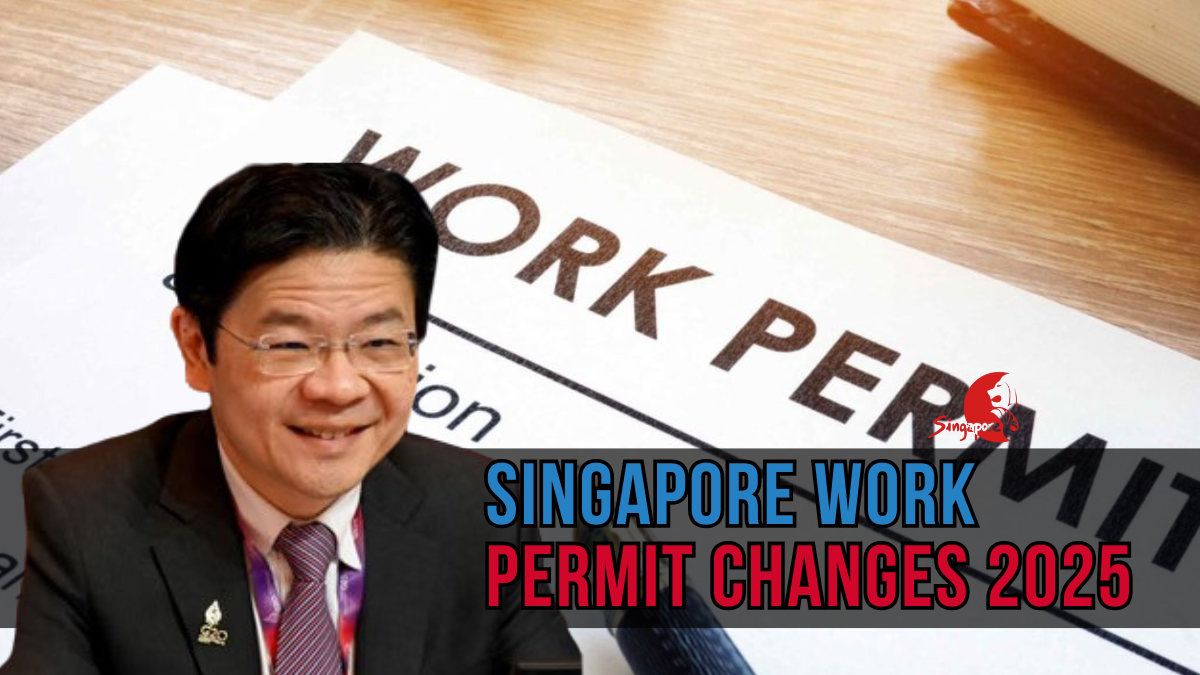Singapore is set to implement major work permit changes in 2025, as announced by the Ministry of Manpower (MOM). These updates are part of a strategic shift aimed at reducing over-reliance on low-cost foreign labour and fostering a higher-skilled, more productive workforce. The reforms impact both employers and foreign job seekers, especially in key sectors like construction, manufacturing, and marine.

Whether you’re an aspiring worker planning to move to Singapore or an employer who hires foreign staff, this guide outlines everything you need to know about the new 2025 rules.
Summary Table: Singapore Work Permit Changes 2025
| Feature | Details |
|---|---|
| Policy Name | Singapore Work Permit Eligibility Reform 2025 |
| Effective Date | From September 2025 onwards |
| Announced By | Ministry of Manpower (MOM) |
| Key Changes | New salary thresholds, age limits, skills criteria, and employer obligations |
| Target Sectors | Construction, Marine, Manufacturing, Services |
| Application Process | Digital-first, faster processing for complete submissions |
| Official Website | https://www.mom.gov.sg |
Key Updates in the 2025 Work Permit Framework
1. Increased Minimum Salary Thresholds
Singapore is raising the minimum salary requirements for work permit holders in labour-intensive sectors. While specific figures vary by sector, the overarching goal is to:
- Attract higher-quality, skilled foreign workers
- Reduce the country’s dependency on low-wage labour
- Align foreign compensation with market value and productivity
Employers hiring foreigners must now budget for more competitive wages, especially in construction, marine, and manufacturing roles.
2. New Age and Skill-Based Eligibility Rules
Foreign workers applying for a Singapore work permit must now satisfy stricter personal criteria, including:
- Maximum age limit: 50 years
- Minimum educational qualifications: Technical certification, diplomas, or degrees
- Relevant industry experience: Must match job roles applied for
This shift ensures that incoming foreign workers are not only physically fit for their roles but also technically equipped to contribute meaningfully to Singapore’s economy.
3. New Requirements for Employers
Employers looking to hire foreign talent must now demonstrate:
- Efforts to hire locals first, such as advertising jobs on national platforms like MyCareersFuture
- Workforce upskilling initiatives for local employees
- Detailed justification for hiring foreigners, including business necessity and job descriptions
- Compliance with quota and levy rules under MOM’s guidelines
Failure to meet these conditions can result in application delays, rejections, or even penalties and blacklisting for non-compliant companies.
4. Digitised & Faster Application System
Singapore has introduced a revamped digital application process. While approvals may now take just a few days, the speed comes with a caveat:
- Only fully completed applications with correct documents will qualify for quick approval
- Missing or incorrect documentation will lead to rejection or delays
- Online tracking and updates will now be integrated via the MOM portal
What These Changes Mean for Key Stakeholders
For Employers
- Review current hiring policies and reliance on foreign labour
- Upskill local employees to meet job needs
- Ensure full documentation when applying for foreign hires
- Be ready for greater scrutiny from MOM during audits and renewals
For Foreign Workers
- Start preparing early: Gather and certify all academic and work-related documents
- Be aware of the new age limit and match your experience to the relevant sectors
- Increase your chances of approval by obtaining technical certificates or skills-based credentials
- Use government-approved agents and avoid fraudulent facilitators
Broader Objective: Sustainable Workforce Development
These reforms are not isolated—they are part of Singapore’s long-term strategy to build a resilient, inclusive, and high-performing economy. The government’s goals include:
- Supporting local employment
- Encouraging skills transfer and innovation
- Making foreign worker policies future-proof against global competition
- Ensuring fair working conditions for all workers—both foreign and local
The policy rewards companies that invest in local manpower and make thoughtful foreign hires aligned with productivity.
Frequently Asked Questions (FAQs)
Q1. When do the 2025 work permit changes take effect?
They take effect from September 2025, as per MOM’s official announcement.
Q2. What is the new age limit for foreign workers?
The maximum allowable age for new applicants is 50 years.
Q3. Are employers required to hire locals first?
Yes. Employers must advertise jobs locally and demonstrate efforts to hire Singaporeans before turning to foreign labour.
Q4. Will these changes affect renewal applications?
Yes. Renewals must also meet new salary thresholds and skills-based assessments unless exemptions apply.
Q5. How can foreign applicants improve their eligibility?
By gaining technical skills, updating certifications, and aligning qualifications with Singapore’s sector-specific job requirements.
Final Thoughts: Prepare Now for Singapore’s Evolving Workforce Rules
Singapore’s 2025 work permit changes represent a significant shift in labour policy that reflects the country’s broader ambition to balance foreign manpower with local employment development. Employers and job seekers must stay updated, proactive, and compliant to ensure success.
Whether you’re a skilled professional hoping to work in Singapore or a business navigating hiring complexities, being well-informed and prepared is key to thriving under the new system.
Official Source:
Visit https://www.mom.gov.sg for detailed application procedures, updated salary thresholds, sector-specific guides, and live support tools.
For More Click HERE
